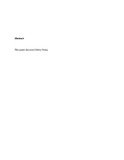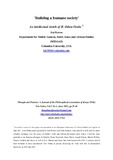| dc.description.abstract | This paper discusses Odera Oruka’s philosophical work from the perspective of its emphasis on the ‘practical’ impetus that Oruka himself underlined. In different ways, his various projects - his sage philosophy, his philosophy of liberty, his environmental philosophy and, perhaps most importantly, his critiques of African (and implicitly Kenyan) social and political realities - can be seen as manifestations of his commitment to the practical relevance and social significance of knowledge, and his conviction about the potentially liberating force of philosophical critique. Here, I try to provide an overall sketch of this agenda, seeking to initiate more thorough and detailed discussion for the future. As a main reference point for discussion, I look at how the term ‘humanism’ has been used (and can be used) to describe Oruka’s work, in contrast to the invocation of this term by some nationalist political ideologies, in particular Moi’s so-called ‘nyayo philosophy’. Oruka’s work could be more explicitly appreciated and explored, I argue, for the ways in which he observed and actively criticized instances of inhumanity and ‘false humanism’ in post-colonial Africa. | en_US |


